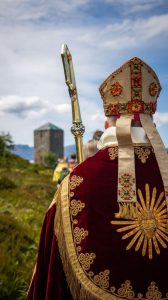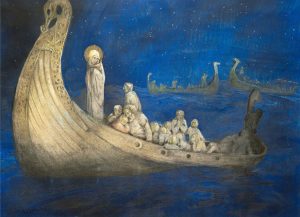Words on the Word
St Sunniva
The feast of St Sunniva, Norway’s portmartyr, is kept today, 8 July. This sermon was preached last Saturday during a pilgrimage to Selja.
Proverbs 10:28-11:11: The hopes of the wicked come to nothing.
Matthew 10:26-33: There is nothing secret that will not become known.
In the Gospel our Lord tells us: ‘Have no fear’, ‘Be not anxious’, ‘Do not be afraid’ (Mt 10.26, 28, 31). We live, though, in fearful times. Mental health is parlous. Many are deeply troubled in body and soul. Ongoing wars open apocalyptic prospects. Strong migration,  coupled with the fact that Europe just isn’t reproducing itself, makes the future uncertain: what sort of society is being formed? Then there is ecological menace. We have read about it for years. We know that the Poles are melting, but they are far away. The last few days’ extreme heat in Europe, causing illness and terrifying fires, brings the question closer: what will happen when parts of the earth become uninhabitable?
coupled with the fact that Europe just isn’t reproducing itself, makes the future uncertain: what sort of society is being formed? Then there is ecological menace. We have read about it for years. We know that the Poles are melting, but they are far away. The last few days’ extreme heat in Europe, causing illness and terrifying fires, brings the question closer: what will happen when parts of the earth become uninhabitable?
Spontaneously we might think that what is needed is money, sufficient means to work out a genuine political project, civilising enterprises, inventions that will let nature recover its balance. But is money enough?
You would expect, wouldn’t you, a bishop to ask a question like that, then to point towards spiritual values. By all means: I believe in spiritual values. I am happy to point towards them. But what causes this query to niggle me today comes from a different, frankly undevotional source.
The other day I listened to a long conversation Ross Douthat conducted on 26 June with Peter Thiel. Thiel is not just one of the world’s richest people; he is a sharp analyst, interesting to listen to. It impressed me, therefore, that he, who has cash enough to purchase anything he wants, kept expressing deep worry: worry concerning too slow technological advances, worry about societal tendencies and culture. Thiel is not the only one to feel this way. He referred to a recentish exchange with his colleague Elon Musk (richer still), and noted that Musk has lost hope in expeditions to Mars as a political project. Musk is said to have exclaimed, distraught: ‘There’s nowhere else to go!’
A confrontation with finitude and attendant risk, capital notwithstanding.
The fact that our time’s most moneyed men, who embody what most people would think of as spectacular good fortune, can look around, contemplate the world, and experience a kind of despair, feeling caught, makes me thoughtful. It challenges me as Christian to show concretely that I wish to live on different terms.
Those terms are shown us by the holy woman in whose honour we are gathered here on Selja.
Sunniva was an Irish princess raised a Christian, heir to the harvest of faith sown in her country by Gallic monks settled on rocks along the coast to sing Christ’s praise and by faithful bishops who taught the fullness of faith with wisdom and grace.
Sunniva’s father died while she was still young; it became her task to govern the land. She became an object of desire for strivers. We read that a viking chief, one of our ancestors, sought to conquer her — a significant detail in the light of the story’s development. Sunniva declined this man’s advances. Not only was he an uncouth heathen; Sunniva had, like St Cecilia and other Virgin Martyrs we name in the Roman Canon of the Mass, consecrated her life to the Lord. She had resolved to live and die a virgin. The viking went berserk. Unable to charm Sunniva, he tried to compel her. He robbed and pillaged in her territory. Sunniva saw that she had, for the sake of the people, to get away.
The way Sigrid Undset retells the story, Sunniva gathered her people around her. She had had enough, she said, of heeding the whims of ‘all those people who crave the passing pleasures of this brief life’. She did not wish, by remaining in Ireland, to put at risk those for whom she was responsible. Therefore she made a weighty decision: ‘I will no longer be a thrall carrying grief and anxiety on account of such things as my enemies can steal from me or devour by fire. I will rather act as befits a noblewoman. I declare myself free and surrender myself to the power and care of my Lord, Jesus Christ.’ On that basis she abandoned herself, as St Olav would do on Stiklestad a couple of hundred years later, into the Lord’s hands.
She and her retinue went on board ships that had neither sails nor rudders. Providence should be free to bear them where it pleased. And so she ended up here, in this inhospitable place, where she became a seed of Norwegian Christianity.
It touches me that the Godpleasingness of Sunniva was revealed, after her death, by two sensible signs: the first was a strange perfume emanating from the grotto right behind us, where she had died; the second was a gentle, kindly light that rested on this island. ‘I am the light of the world’, says our Lord; St Paul exhorts us to carry abroad ‘the fragrance that comes from knowing [Christ]’ (2 Cor 2.14). It isn’t aways a great deal of talking that will best witness to Christ’s grace. More compelling is a given life, a life lived faithfully unto death.
Sunniva was free to choose and act, and thereby graced with fecundity, precisely because she did not fear death. She had acquired the essential consciousness that defines a Christian: the certainty that death has lost its sting and is therefore nothing to make such a fuss about. What matters is not just to survive for a shorter or longer time. What matters is to live the measure of our days here on earth fully and in truth, in order to be readied to enter eternal life.
I thought of St Sunniva when Peter Thiel, in the interview, mentioned a freezing party he had attended in the early noughties, presenting offers to deep-freeze people until such a time when science, hypothetically, would have found an ambrosia that might ensure them endless existence. And it struck me how absurd our sophisticated, frightened, godless epoch appears when considered through the lens of the saints’ sovereign, strong testimony to liberty.
Let us follow their lead, then, and make right decisions in matters both great and small.

St Sunniva and her companions as Gösta af Geijerstam, a friend of Sigrid Undset’s, imagined them.
